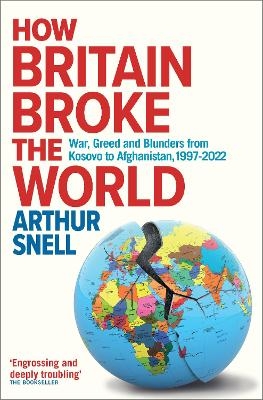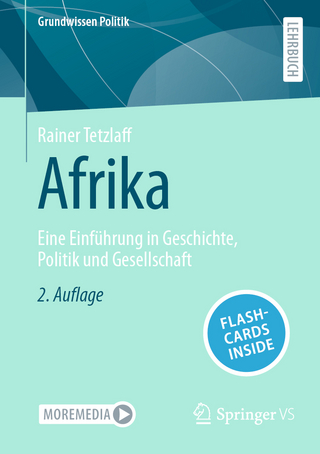
How Britain Broke the World
Canbury Press (Verlag)
978-1-912454-60-0 (ISBN)
- Titel ist leider vergriffen;
keine Neuauflage - Artikel merken
"Engrossing and frankly deeply troubling" - The Bookseller
"I cannot recommend this book highly enough" - Monocle
"One of the most engaging and original analyses I’ve read of events of the last quarter century” - Shakespeare & Co
"Buy this book" - John Sweeney, journalist
Turmoil in the 2020s.
Russia has invaded Ukraine.
China threatens Taiwan and Southeast Asia.
Endless war in the Middle East sends waves of migrants and terrorists around the world.
And the biggest nations on Earth cannot agree effective action to stop global heating.
Instead of being a global force for good and actively preventing some of these problems, Britain has all too often fostered instability and division. In fact, the UK’s careless ‘humanitarian’ interventions, grandiosity and greed have helped to fracture the global order built after World War II, argues former British diplomat Arthur Snell in this pithy book.
Why is the world so dangerous now?
How Britain Broke the World critically assesses UK foreign policy over the past 25 years, from Kosovo in 1998 to Afghanistan in 2021, while also scrutinising British policy towards the powerhouses of the USA, Russia, India, and China.
Far from being unimportant, Snell reveals, Britain has often played a pivotal role in world affairs, for instance, by supplying the false intelligence that justified the Allied invasion of Iraq and and by plugging Russia’s corrupt elite into Western economies.
Then come the bungled humanitarian interventions in foreign states.
Without the UK’s marginal but key role, the author argues, it’s likely that wars would not have blighted the Balkans, Iraq, and Libya, hundreds of thousands of lives would have been saved, and the world would be a safer place in the 2020s.
Taking in Russia’s full-scale invasion of Ukraine in 2022, Snell charts the key political, economic and geographic factors that drive the behaviour of the most powerful and populous countries.
Like a diplomatic version of Prisoners of Geography by Tim Marshall, How Britain Broke the World reveals the ignominious reality of UK foreign policy and the true state of world affairs. It is a must-read for anyone interested in Britain's role in international affairs.
Review
‘In this engrossing and frankly deeply troubling book, former senior British diplomat Snell explains how Britain’s often incompetent, inconsistent and sometimes downright greedy foreign policy has played a pivotal role in rendering the world a more dangerous place. Not only in regard to Russia, where successive British governments have helped to plug Putin's oligarchy into the Western economic system, but also when it comes to the wars in Kosovo, Iraq, Libya and more' – The Bookseller's Caroline Sanderson, awarding an 'Editor's Choice' for Non-fiction
"Diplomats are masters of urbane double-talk, so it is refreshing to find a former Foreign Office mandarin issuing a trenchant indictment of Britain's deplorable geopolitical performance over the last twenty-five years." – Literary Review
About the Author
After graduating from Oxford with a first class degree in history, Arthur Snell joined the Foreign and Commonwealth Office.
A fluent Arabic speaker, he served in Afghanistan, Zimbabwe, Nigeria, Yemen, and Iraq.
He headed the international strand of the UK Government’s Prevent counterterrorism programme.
He is currently a geopolitical consultant and host of the hit podcast Doomsday Watch.
Extract
There was a brief silence after the bomb blast. Then shouting, and nervous laughter. The Iraqi official gestured to the shattered window and stammered: ‘Shay ‘aadi,’ a ‘normal thing.’ We were both uninjured, but I learned later that several guards had died outside the office where we were meeting. It was 2005 and I was in Baghdad, working as a British diplomat. Car bombs were normal. As I left the building I noticed a charred hand on the ground, probably the bomber’s.
...That day, in the bombed building, I could no longer deny to myself that the Allied powers had unleashed a terrible whirlwind. Now, as I write in the early 2020s, the existence of Islamic State is a direct consequence of the 2003 invasion. But the impact of that terrible mistake stretches far wider: from regional chaos in the Middle East, to shredding the credibility of Western governments, to the renewed power of autocratic countries, chiefly Russia and China.
A FAILING WORLD ORDER
The unsteady rules-based international order finally collapsed on 24th February 2022, when Russia launched a full-scale invasion of Ukraine. Under stress for some time, this system – international law, accepted national borders, with the United Nations as global police chief – had delivered peace and security for most Western democracies from World War II into the 1990s. Admittedly, many countries, particularly in the Global South, missed out on the upsides. But a world without this framework is volatile. We are living in a period of global disorder, conflict and uncertainty. As I write in 2022, major conflicts are laying waste to the large and geopolitically sensitive states of Ukraine, Libya and Yemen, and civil wars are raging in the large countries of Ethiopia and Syria. In addition, an arc of instability runs across the entire Sahel region of Africa and widespread civil strife continues in Myanmar, Afghanistan and Iraq. Running alongside these flashpoints is the spectre, once more, of great power conflict.
Contents
Introduction
1. An 'Ethical' Foreign Policy
2. Kosovo: War in Europe
3. Iraq, MI6 and a Botched Invasion
4. Afghanistan: 'Government in a Box'
5. Libya: Creating a Power Vacuum
6. Syria: A Conflict Without End
7. Russia and the London Laundromat
8. China: the Golden Error of Kowtow
9. Saudi Arabia, Oil and Influence
10. India and the Politics of Empire
11. The US and the UK 'Special' Relationship
12. Brexit: Isolation in Europe
Conclusion
Acknowledgements
References
Index
Buy the book to carry on reading.
After graduating from Oxford with a first class degree in history, Arthur Snell joined the Foreign and Commonwealth Office. A fluent Arabic speaker, he served in Afghanistan, Zimbabwe, Nigeria, Yemen, and Iraq. He headed the international strand of the UK Government’s Prevent counterterrorism programme. He is currently a geopolitical consultant and host of the podcasts Doomsday Watch and Behind the Lines.
INTRODUCTION. Former diplomat Arthur Snell starts with a car boom in Baghdad in 2005, amid the failure of the Allied operation after the Iraq War - which was a blow to the International rules-based order and shredded the credibility of Western governments, benefitting autocratic China and Russia
1. AN 'ETHICAL' FOREIGN POLICY. In 1997 the Labour Foreign Secretary Robin Cook set out the 'ethical' approach of Tony Blair's government to foreign policy. It spawned a doctrine of liberal intervention in foreign countries, starting with Kosovo, but extending to Iraq, Libya and Afghanistan
2. KOSOVO: WAR IN KOSOVO. Tony Blair's Labour government put together a global coalition to bomb Serbia to protect Kosovar Albanians, but, despite headlines to the contrary, the operation was not a success. Slobodan Milošević's forces increased their repression before NATO ground troops invaded
3. IRAQ, MI6 AND A BOTCHED INVASION. The Allied invasion of Iraq in 2003 was built on bogus intelligence that Saddam Hussein had weapons of mass destruction, largely supplied by Britain's Secret Intelligence Service, MI6. Mismanagement of Iraq post-Invasion fomented strife between Sunni and Shia
4. AFGHANISTAN: 'GOVERNMENT IN A BOX'. Britain failed to learn from the failures of its previous embarrassments in Afghanistan when it joined US forces in invading the country after the 9/11 attacks. The UK and US wrongly believed they could impose top-down rule on a massive, complex tribal country
5. LIBYA: CREATING A POWER VACUUM. Britain's role in unseating Libyan dictator Muammar Qadhafi in 2011 shows that Britain had not learnt the lessons from earlier failed liberal interventions. Its basis was false: no massacres were imminent. Post-invasion Libya has collapsed into chaos
6. SYRIA: A CONFLICT WITHOUT END. The ethnic composition of Syria is such that Bashar Al-Assad was always likely to cling to power. While there have been actual massacres involving actual weapons of mass destruction, Britain and other Western powers have allowed the Syrian civil war to rage for years
7. RUSSIA AND THE LONDON LAUNDROMAT. Britain has welcomed Russian billionaires to London, where they spend lavishly on financiers, lawyers, accountants. Ill-gotten riches have been ploughed into the heart of the UK financial system
8. CHINA: THE GOLDEN ERROR OF KOWTOW. Despite China respecting power and toughness, David Cameron's government prostrated itself before Beijing in an attempt to lure Chinese money, which has been pumped into UK telecommunications and the nuclear industry
9. SAUDI ARABIA, OIL AND INFLUENCE. Britain helps run the Saudi military in exchange for big defence deals and other riches, while turning a blind eye to Saudi human rights abuses, sponsorship of Islamic extremism and its destruction of Yemen
10. INDIA AND THE POLITICS OF EMPIRE. Britain has swithered over its response to India’s Prime Minister Narendra Modi, who has fostered Hindu extremism that threatens other religious groups in India such as Muslims and Christians. More recently the UK has misunderstood India's post-Brexit demands
11. THE US AND THE UK 'SPECIAL' RELATIONSHIP. Britain has consistently overestimated the strength of its strategic alignment with America, which is on a par with that of France or Germany. The US-UK relationship is primarily about security as part of the 'Five Eyes' intelligence network
12. BREXIT: ISOLATION IN EUROPE. While an important regional power, with considerable resources, the UK can overestimate its ability to shape events and in recent decades has tended to be chronically short-termist
CONCLUSION. Britain has considerable gusto for bold initiatives, such as the interventions in Kosovo, Libya, Afghanistan and Iraq. But it does not have the enthusiasm for considering their long-term implications. The system lacks expertise and is unwilling to listen to external experts.
ACKNOWLEDGEMENTS. 'Many of the people I owe the most to cannot be named. They know who they are and I am eternally grateful. These people collectively have centuries of experience in every corner of the world and it has been my privilege to work alongside them.'
REFERENCES. A full list of notes and sources for key facts about British foreign policy. The sources range from books about the UK's military interventions to think tank reports to newspaper coverage.
INDEX. From Abdullah, King of Saudi Arabis, to Zimbabwe, an extensive list of pages references
| Erscheinungsdatum | 06.08.2022 |
|---|---|
| Zusatzinfo | 4 inset maps; 1 diagrams; 1 iondex |
| Sprache | englisch |
| Maße | 154 x 234 mm |
| Gewicht | 600 g |
| Themenwelt | Geisteswissenschaften ► Geschichte ► Regional- / Ländergeschichte |
| Sozialwissenschaften ► Politik / Verwaltung ► Europäische / Internationale Politik | |
| Sozialwissenschaften ► Politik / Verwaltung ► Staat / Verwaltung | |
| ISBN-10 | 1-912454-60-2 / 1912454602 |
| ISBN-13 | 978-1-912454-60-0 / 9781912454600 |
| Zustand | Neuware |
| Haben Sie eine Frage zum Produkt? |
aus dem Bereich


